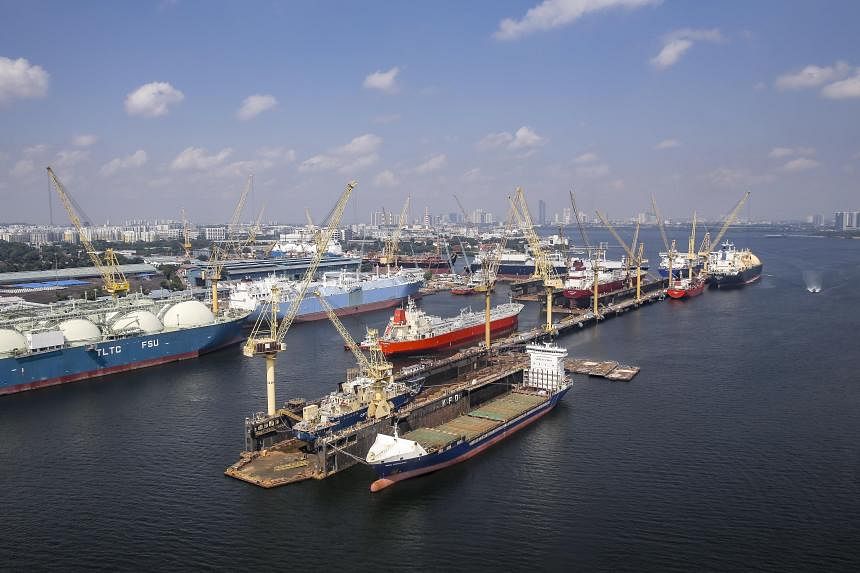SINGAPORE – Changes to foreign work pass policies might hit shipbuilders and other firms in the short term, but they could also deliver long-term benefits in the form of higher productivity and competitiveness, say industry insiders.
The reforms were unveiled by Manpower Minister Tan See Leng on March 4 during the debate on the ministry’s budget.
Some of the key changes centre on the marine industry. Firms in the shipyard sector will be able to hire up to three work permit holders for each local employee from Jan 1, 2026, down from 3.5 now.
Moreover, the levy for its basic-skilled work permit holders will be increased from $400 to $500 and from $300 to $350 for higher-skilled staff.
The moves were made to spur the sector’s pivot to more productive and resource-efficient activities.
Work permit holders undertake menial but essential roles that Singaporeans are not keen to take up despite the industry’s efforts to prioritise local hires, said a spokesman for the Association of Singapore Marine and Offshore Energy Industries. These roles include welding, pipe fitting, blasting and painting, and cleaning and scaffolding, he said.
He added that marine sector companies must consider the additional investment needed to further improve productivity and the extra time needed to complete projects given the tightened quota.
“Immediately, companies who have a regional network of production facilities will have to shift labour-intensive work to their regional facilities,” added the spokesman.
He noted that foreign workers at subcontracting firms in the marine shipyard sector can sometimes count towards the quota of the shipyard that has subcontracted them.
This means the reduced quota directly will impact many subcontractors that are small and medium-sized enterprises (SMEs) operating only within Singapore.
But he added: “The rationale behind the proposed changes to stimulate growth within the marine shipyard sector towards enhanced productivity and resource efficiency is both sensible and forward-thinking.”
He said the marine and offshore energy sector will need to lean in on its expertise in higher-value customised work when adapting to the new rules, while gradually transitioning out of less efficient work to ensure enough revenue inflow to fund ongoing transformation efforts.
“It’s crucial to ensure that the sector receives adequate support in terms of training programmes, financial assistance, and regulatory flexibility to navigate through these changes effectively,” the spokesman said.
Marine and offshore energy companies should explore regional opportunities, while the Government could consider providing progressive companies in the sector their own foreign worker quota, instead of those derived from shipyards, he added.
“As per any industry transition, there may be companies unable to sustain their business with these changes.
“Consolidation and mergers could be a natural consequence, potentially affecting service delivery in the short term. However, this could lead to either a more streamlined and competitive industry in the long run.”
Mr Leong Yow Seng, chief sustainability officer at ASL Marine Holdings, which builds, repairs and charters out vessels, said the lead time provided was “a bit short but doable”.
He said the company, which employs about 120 work permit holders, will further automate and digitalise its operations in procurement and other corporate functions to offset increased labour cost from the changes.
“We can’t just pass on everything to customers, due to our competition,” he added, citing the pricing of work in shipyards in China, India and the Middle East.
“We will have to rationalise the best way to shift jobs around.”
This means potentially persuading shipowners to send ships to its Batam shipyard for lower-skilled work, such as simpler welding projects, while keeping higher-value work like complex equipment installation in Singapore, Mr Leong said.
Some essential roles, like welding, require a human touch as project requirements vary too significantly to be readily automated, he added, noting: “We are not like a manufacturing line; we can’t use a robot to weld for every job.”
The other changes affect the minimum qualifying monthly salary for an Employment Pass (EP) holder.
This will be raised from $5,000 to $5,600 from Jan 1, 2025, for new applicants and from Jan 1, 2026, for those renewing their passes.
People working in financial services will be earning $6,200 a month, up from $5,500 now, in view of the sector’s higher wage norms.
Mr Nilay Khandelwal, managing director of talent consultancy PageGroup in Singapore, said some local fresh graduates could see a jump in salary offers towards the $5,000 range as a result.
“For management associate or trainee programmes in multinational firms, we could see a shift towards more local hiring of fresh Singaporean graduates from top universities.”
Those entering back office roles in financial services also stand to benefit, he added, because employers would likely need to expand hiring of fresh local talent in both segments in lieu of entry-level foreign professionals.
However, Mr Khandelwal warned that some multinationals could shift openings for junior professionals to elsewhere in the region, such as Malaysia and Indonesia, due to the higher cost.
Mr Richard Bradshaw, chief executive for Asia at executive search firm Ethos BeathChapman, said the increased qualifying salary will likely squeeze smaller enterprises.
“For example, cutting-edge SMEs and start-ups will lack the resources to offer higher base salaries, or other components of remuneration to make up for it, compared to their bigger counterparts, but still require technical skills they may only be able to find with EP holders,” he added.
“We advise such clients to think outside the box with remuneration packages, start searches earlier, and predict as best they can roles that may require to be filled by EP holders, to give finding Singaporean candidates a bigger chance.”


